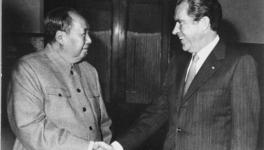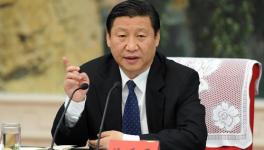Bo Xilai and the Ides of a long March
“One of a rising number of "princelings" and given the get out order after an embarrassing fallout following a bitter and personal fight” - this is the generic story that has been put up by the Western press after the dismissal of Chinese Politburo member Bo Xilai from the post of Chinese Communist Party committee secretary in Chongqing following a rare direct public attack on him by prime minister Wen Jiabao.
But as one scratches the surface and digs a bit deeper into the Bo Xilai dismissal story, there seems to be a lot more than just a case of political intrigue. Bo is (was?) not merely yet another faceless figure – on the contrary he is a very public, media friendly and charismatic politician – aspiring to accommodate himself in the highest echelons of the collective leadership of the Chinese Communist Party. His secretary-ship of the Chongqing metropolis catapulted him into popularity as an ascendant “New Left” in China embraced him as a pole in the singe party polity to articulate an alternate set of socio-economic policies that diverged dramatically from what the political leadership was following.
Bo had launched a massive crackdown on organized crime and corruption in Chongqing – ruthlessly targeting the elite from the judiciary, public officialdom apart from local mafia and the rich – endearing himself to the people of the megapolis. More importantly, he combined this populist approach towards law and order with an emphasis on redistribution – utilizing surpluses from the heavy industry in the region to build social housing for the poor, helping the rural poor relocate to urban areas and the likes. Bo buttressed this populism with an hearkening back to the Maoist past of China, invoking slogans and symbols of the pre-Cultural Revolution and the same period by initiating campaigns for singing revolutionary songs for example. Bo’s vision was to highlight the socialist past of the party while being cognizant of the errors committed during an extremist diversion during that past. Indeed, this emphasis on social redistribution, a true left agenda and attacking the bane of “reforms China” – steep inequality and corruption – won him support from the “New Left”.
The New Left
What is this “New Left” in China is the first obvious question that should to come to the non-China-watcher's mind. Is this a grouping that looks wistfully at the Maoist past and wants a return to statism of that era? From all accounts, that is an inaccurate assessment of the grouping. The “New Left” – a group of academicians, intellectuals and other public figures – argue for a diversion from the current politico-economic strategy of the Chinese state. They point out to the limits of benefits from the economic reforms that have liberalized and privatized Chinese economy over the years resulting in a tremendous burst of growth. They focus particularly on the rising inequality, the skewed urban-rural divide, the increasing neo-rich compared to a growing stagnation at lower levels of society, the great malfeasance and corruption in ruling circles and more. They delineate themselves from the “liberal intellectuals” in China, who support the continuation of economic reforms, but want the political system to be converted to a liberal-democratic model. The New Left also argues for democratization and rights to free speech, but they invoke the socialist Constitution of China to do so and want to do away with the China’s market-centric trajectory, arguing instead for social equity and social security.
There are various shades of opinion within the New Left and also from outside the grouping that are more openly arguing for a return to the Maoist past of authoritarian socialism. Within the New Left, apart from those who critique the turn toward neoliberalism (with Chinese characteristics) in China over the years and argue for redistributive policies, there are also those who tinge their critique with favourable references to Mao Zedong thought – with some cognizant of its failures in reality and some not. The groups within the New Left however seem to coalesce around versions of democratic socialism, promotion of various models of production beyond capitalism (with Chinese characteristics), and emphasis on popular and participative democracy. As this article lucidly points out, the New Left – has hitherto, as we will explain later – suffered from a limitation that it is more of an academic endeavor which lacks genuine political or grassroots support, partly because of the structure of China’s political system.
It is in this context, that one should note the presence of Bo Xilai as a rising political personality in the Chinese Communist Party. Bo’s policies, which evoked tremendous support from the Chinese people – evidenced in the support for and discussion about the “Chongqing model” in the loud discussion forums among Chinese netizenry – enabled sections of the New Left to coalesce around him. Chinese academic and New Left intellectual, Cui Zhiyuan, for example, is a policy adviser to Bo Xilai and the Chongqing government. The New Left seems to have got what it lacked earlier, a political pole to call as one of their own and someone who held tremendous popularity.
It is in this light that one should see Bo Xilai’s sudden removal from his Chongqing post. New Left intellectuals such as Mingqi Li– who have been more vociferously in favour of Maoist positions as compared to the likes of Cui Zhiyuan – argue that Bo’s dismissal is a signal for the victory of “rightist forces” in the Chinese Communist Party, as this Real News Video featuring Mingqi Li’s interview points out –
Reaction to Bo’s dismissal
Considering these facts, it is clear that the portrayal of Bo Xilai’s dismissal as simply a case of political intrigue related to this or that aspect of his personality is an incorrect, perhaps false and incomplete reading of the situation, in tune with the liberals’ interpretation of Bo Xilai and his work in Chongqing. As premier Wen Jiabao’s statements point out, this is indeed the outcome of an ideological struggle or at the least a new ideological struggle, which has been attempted to be nipped in the bud.
That has not stopped China’s netizenry to debate this decision as vociferously as is their wont. The Chinese establishment’s response has been predictable. Reports show how internet searches for “Bo Xilai” have been “Great Firewalled”. China has a notorious record on censorship and the government’s present methods to constrain the fallout of Bo Xilai’s dismissal in public are a cut from the same cloth.
Forthcoming events in China will reveal the direction in which the New Left will act and whether or not there will be other takers of Bo Xilai’s position. We had, sometime ago, talked about a similar set of incidents to Chongqing in Wukan for example.
As the Ides of March, 2012 brings with it, the dismissal of Bo Xilai, it remains to be seen how the New Left in China will continue their “Long March” to rebuild a more egalitarian and democratic China.
Get the latest reports & analysis with people's perspective on Protests, movements & deep analytical videos, discussions of the current affairs in your Telegram app. Subscribe to NewsClick's Telegram channel & get Real-Time updates on stories, as they get published on our website.
























